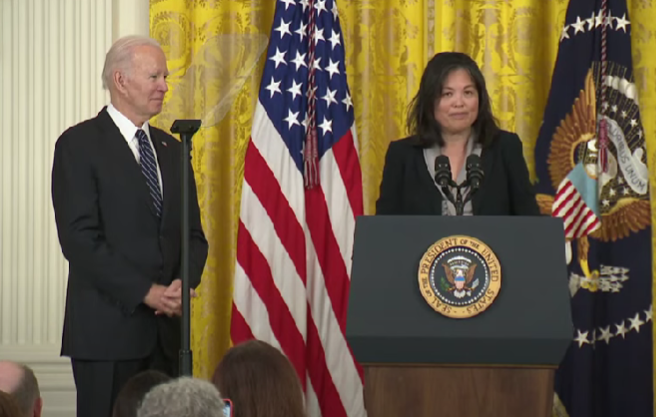It’s been two months since President Biden nominated Julie Su to serve as Secretary of the U.S. Department of Labor in the wake of Marty Walsh’s departure. While Su’s career shows her to be at Big Labor’s beck and call, her road to confirmation has not been a smooth one despite the glowing endorsements of labor unions.
Julie Su is scheduled to face the Senate Health, Education, Labor and Pensions Committee for her confirmation hearing on Thursday, April 20.
Su had most recently served as Deputy Secretary of Labor, a position she won after a razor-thin 50-47 vote.
Swing votes in the Senate indicated that Su is not an appealing replacement for Walsh.
Sen. Joe Manchin (D-West Virginia) recently expressed that he confirmed Su as Walsh’s deputy in 2021 only because he trusted Walsh. Manchin said, “My vote for her last time was all predicated on Marty.” A media report noted that Manchin’s office privately told President Joe Biden that the senator has deep reservations about Su.
The D.C. press has openly wondered whether Su would survive a confirmation vote, with Politico’s latest newsletter remarking, “Julie Su’s confirmation to the government’s top Labor job is shaping up to be a critical test of Democrats’ ability to keep their paper-thin majority taped together.”
Still, Su has continued support from national labor leaders and most Senate Democrats. Liz Shuler, AFL-CIO president, tweeted, “Simply put: There’s no one more dedicated and qualified to defend the fundamental rights of working people than Julie Su. It’s her life’s work. The @AFLCIO is thrilled with her historic nomination to become our nation’s next secretary of labor.”
Su, in an interview about the future of work, said that her role as the secretary for the California Labor and Workforce Development Agency (LWDA) was to “ensure” unions remain strong and can continue to organize in California. She claimed, “There’s data that shows that having a union does more to ensure higher wages than even having a college degree,” though she did not provide evidence for that claim.
Su’s supporters laud her actions in defending low-wage garment workers in El Monte, California and getting $4 million in back wages for workers, which took place in 1995.
But many conservatives were unhappy with Su’s nomination due to her consistent support of Big Labor’s policies. Several California Republican lawmakers warned, in a letter, that Su will likely impose anti-worker laws on a national scale, as she did in California. Republic Reps. Kevin Kiley, Darrell Issa, Young Kim, Tom McClintock, Mike Garcia, and Ken Calvert wrote Su’s “appalling black eye” in her work history was the enforcement of anti-worker law AB 5, which “cost tens of thousands of freelance workers and independent contractors their economic livelihoods.”
While at the LWDA, she supported anti-worker laws like AB 5, a law that reclassified contractors and freelancers as regular employees.
The implementation of AB 5, which happened under Su’s watch, was perceived as heavy-handed and punitive towards contractors and freelancers. Su openly stated that she was willing to conduct “investigations and audits” to enforce reclassification, which negatively affected contractors and freelancers.
But contractors and freelancers disagreed with Su’s interpretation of AB 5’s effects on workers.
An independent truck driver, who was forced to reclassify after AB 5’s passage, said that AB 5 will “kill the liberty of being a trucker” because of all the “regulatory stuff in an over-regulated and complex industry.”
A port driver pointed out that, as an independent contractor, he can earn higher wages on his own. He said, “On a good day, I can make $1,200, but if I go to work for a company and they only pay me $25 an hour and also control the number of hours I can work, I can’t afford to feed my family.”
Critics of Su are also concerned by her involvement in the mishandling of state funds during the pandemic.
While serving as secretary of LWDA, California’s Employment Development Department (EDD) paid $180 billion in benefits during Covid. Of the $180 billion, about $30 billion went to scammers. Ultimately, only $1.1 billion were recovered.
Su, in a press conference, admitted, “There is no sugarcoating the reality. California did not have enough security measures in place.” She also blamed federal officials for not writing the rules properly for the EDD to follow.
Reports noted that Su’s agency failed to follow already-established security measures. An auditor found that Su “directed EDD to pay certain claimants UI benefits without making key eligibility determinations and to temporarily stop collecting biweekly eligibility certifications,” meaning that Su ordered employees to bypass existing security measures.
